Governance and Finance
Corporate governance today is about more than just making profits for shareholders. It now aims to balance the needs of all stakeholders-employees, investors, creditors, and business partners. Good governance helps companies run better, attract talent, gain customer trust, and lower financial costs. Conversely, poor governance can lead to scandals, job losses, and broken contracts.
The “Governance and Finance” research group studies how governance works in modern financial markets. One of the focuses is on how firms choose, motivate, and keep talented leaders, especially CEOs, since exemplary leadership is key to company success.
The group is also interested in investigating how changes in financial markets, like the rise of big shareholders, activist investors, or even creditors, affect company decisions. The goal is to understand how different players and institutions influence company behavior and what that means for the future of business.
Research Cluster
Financial Resilience and RegulationYour contact

- Department Financial Markets
Refereed Publications

Corporate Social Responsibility and Profit Shifting
in: European Accounting Review, No. 1, 2025
Abstract
This paper examines the relation between corporate social responsibility (CSR) performance and tax–motivated income shifting. Using a profit–shifting measure estimated from multinational enterprises (MNEs) data, we find that parent firms with higher CSR scores shift significantly more profits to their low-tax foreign subsidiaries. Overall, our evidence suggests that MNEs engaging in CSR activities acquire legitimacy and moral capital that temper negative responses by stakeholders and thus have greater scope and chance to engage in unethical profit-shifting activities, consistent with the legitimacy theory.
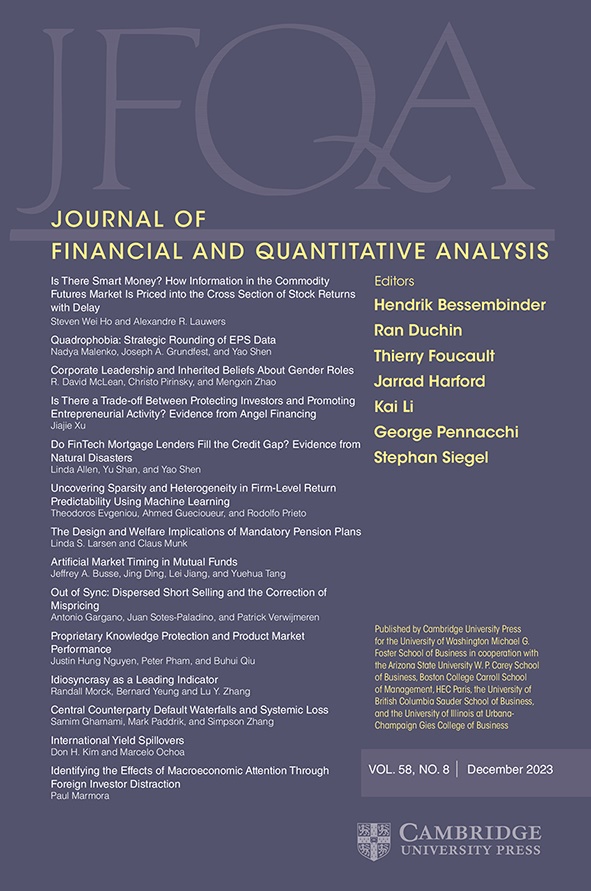
The Effects of Antitrust Laws on Horizontal Mergers: International Evidence
in: Journal of Financial and Quantitative Analysis, No. 7, 2024
Abstract
This study examines how antitrust law adoptions affect horizontal merger and acquisition (M&A) outcomes. Using the staggered introduction of competition laws in 20 countries, we find antitrust regulation decreases acquirers’ five-day cumulative abnormal returns surrounding horizontal merger announcements. A decrease in deal value, target book assets, and industry peers' announcement returns are consistent with the market power hypothesis. Exploiting antitrust law adoptions addresses a downward bias to an estimated effect of antitrust enforcement (Baker (2003)). The potential bias from heterogeneous treatment effects does not nullify our results. Overall, antitrust policies seem to deter post-merger monopolistic gains, potentially improving customer welfare.
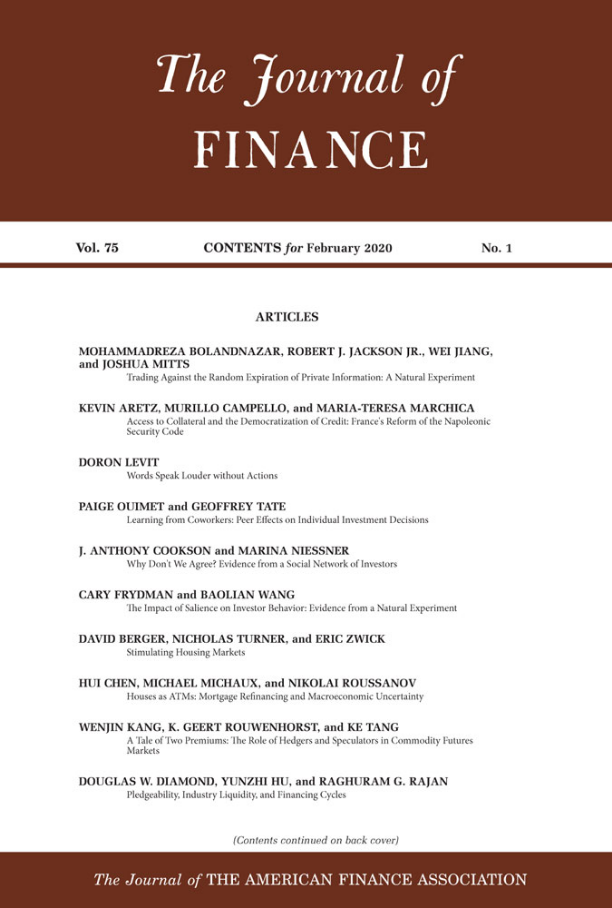
Non-Standard Errors
in: Journal of Finance, No. 3, 2024
Abstract
In statistics, samples are drawn from a population in a datagenerating process (DGP). Standard errors measure the uncertainty in sample estimates of population parameters. In science, evidence is generated to test hypotheses in an evidencegenerating process (EGP). We claim that EGP variation across researchers adds uncertainty: non-standard errors. To study them, we let 164 teams test six hypotheses on the same sample. We find that non-standard errors are sizeable, on par with standard errors. Their size (i) co-varies only weakly with team merits, reproducibility, or peer rating, (ii) declines significantly after peer-feedback, and (iii) is underestimated by participants.
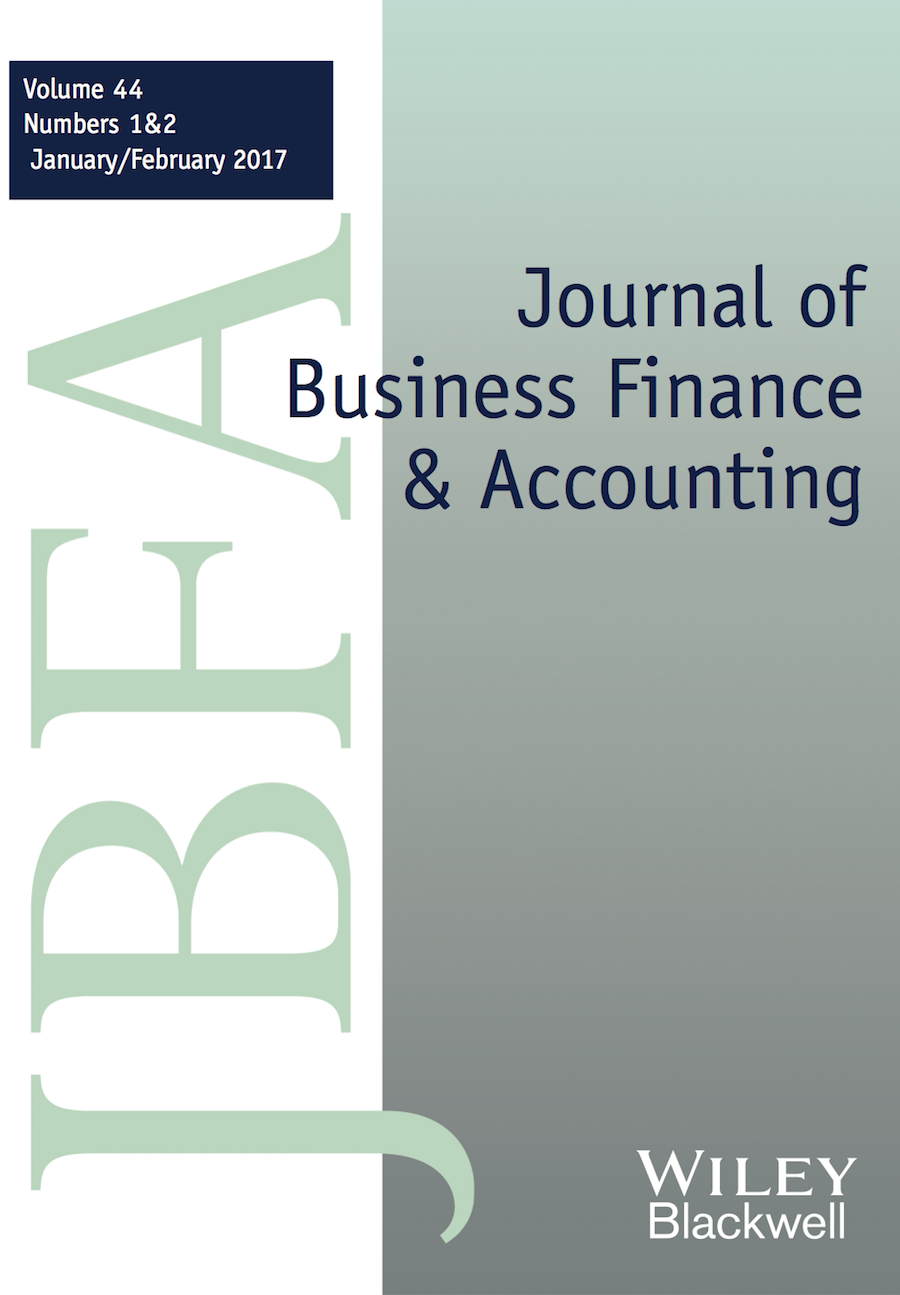
Disentangling Stock Return Synchronicity From the Auditor's Perspective
in: Journal of Business Finance and Accounting, No. 5, 2024
Abstract
<p>This paper investigates a firm's stock return asynchronicity through the auditor's perspective to distinguish whether this asynchronicity can proxy for the company's firm-specific information or the quality of its information environment. We find a significant and positive association between asynchronicity and audit fees after controlling for auditor quality and other factors that affect audit fees, suggesting that stock return asynchronicity is more likely to capture a company's firm-specific information than its information environment. We also find that asynchronous firms are more likely to receive adverse opinions on their internal controls over financial reporting, but are associated with lower costs of capital and auditor litigation, providing further evidence in support of the firm-specific information argument. Asynchronicity's positive association with audit fees is driven by firms with higher accounting reporting complexity, suggesting stock return asynchronicity captures a firm's complexity, resulting in more significant efforts by the auditor.</p>

Regulation and Information Costs of Sovereign Distress: Evidence from Corporate Lending Markets
in: Journal of Corporate Finance, October 2023
Abstract
We examine the effect of sovereign credit impairments on the pricing of syndicated loans following rating downgrades in the borrowing firms' countries of domicile. We find that the sovereign ceiling policies used by credit rating agencies create a disproportionately adverse impact on the bounded firms' borrowing costs relative to other domestic firms following their sovereign's rating downgrade. Rating-based regulatory frictions partially explain our results. On the supply-side, loans carry a higher spread when granted from low-capital banks, non-bank lenders, and banks with high market power. We further document an operating demand-side channel, contingent on borrowers' size, financial constraints, and global diversification. Our results can be attributed to the relative bargaining power between lenders and borrowers: relationship borrowers and non-bank dependent borrowers with alternative financing sources are much less affected.
Working Papers
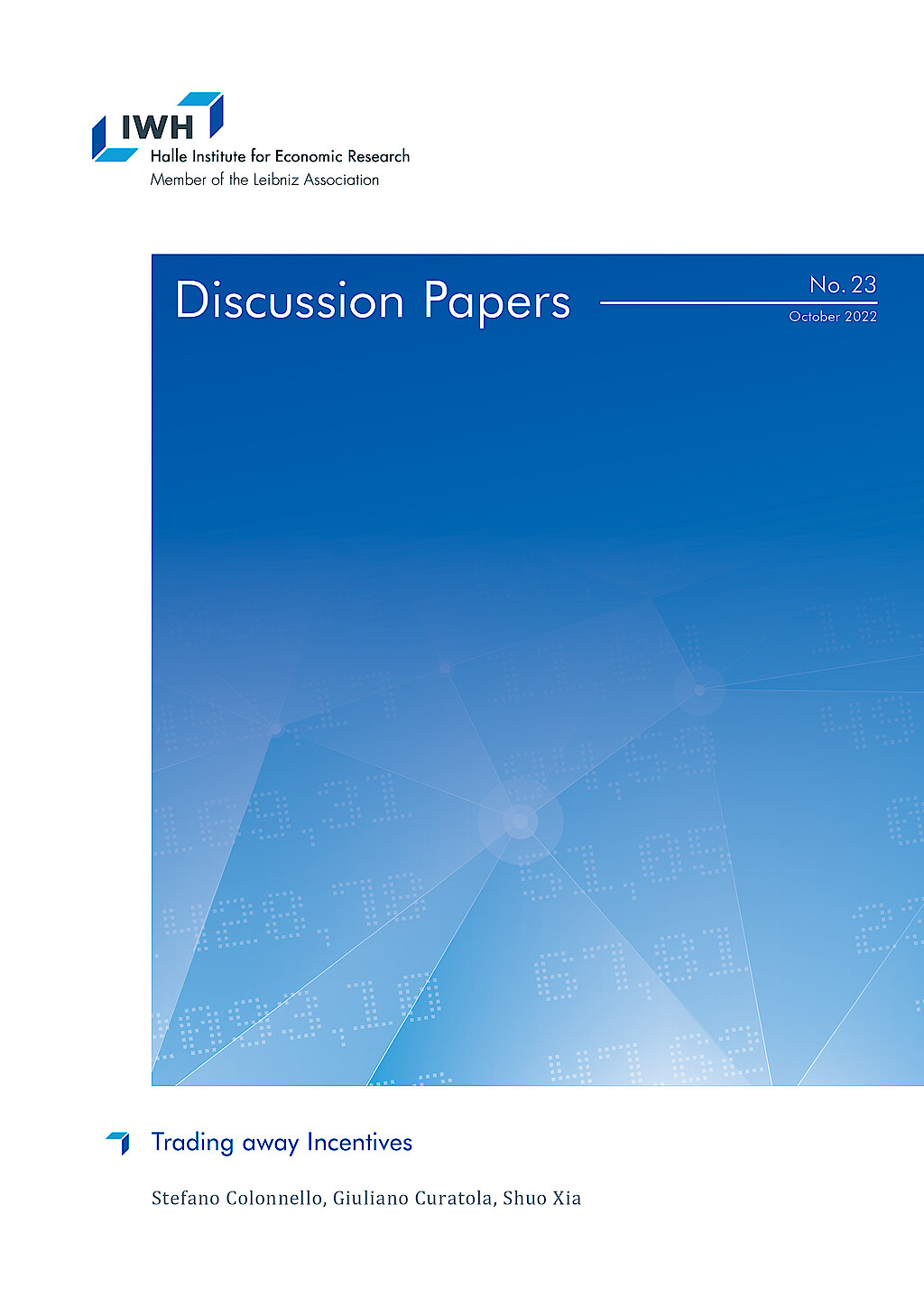
Trading away Incentives
in: IWH Discussion Papers, No. 23, 2022
Abstract
Equity pay has been the primary component of managerial compensation packages at US public firms since the early 1990s. Using a comprehensive sample of top executives from 1992-2020, we estimate to what extent they trade firm equity held in their portfolios to neutralize increments in ownership due to annual equity pay. Executives accommodate ownership increases linked to options awards. Conversely, increases in stock holdings linked to option exercises and restricted stock grants are largely neutralized through comparable sales of unrestricted shares. Variation in stock trading responses across executives hardly appears to respond to diversification motives. From a theoretical standpoint, these results challenge (i) the common, generally implicit assumption that managers cannot undo their incentive packages, (ii) the standard modeling practice of treating different equity pay items homogeneously, and (iii) the often taken for granted crucial role of diversification motives in managers’ portfolio choices.
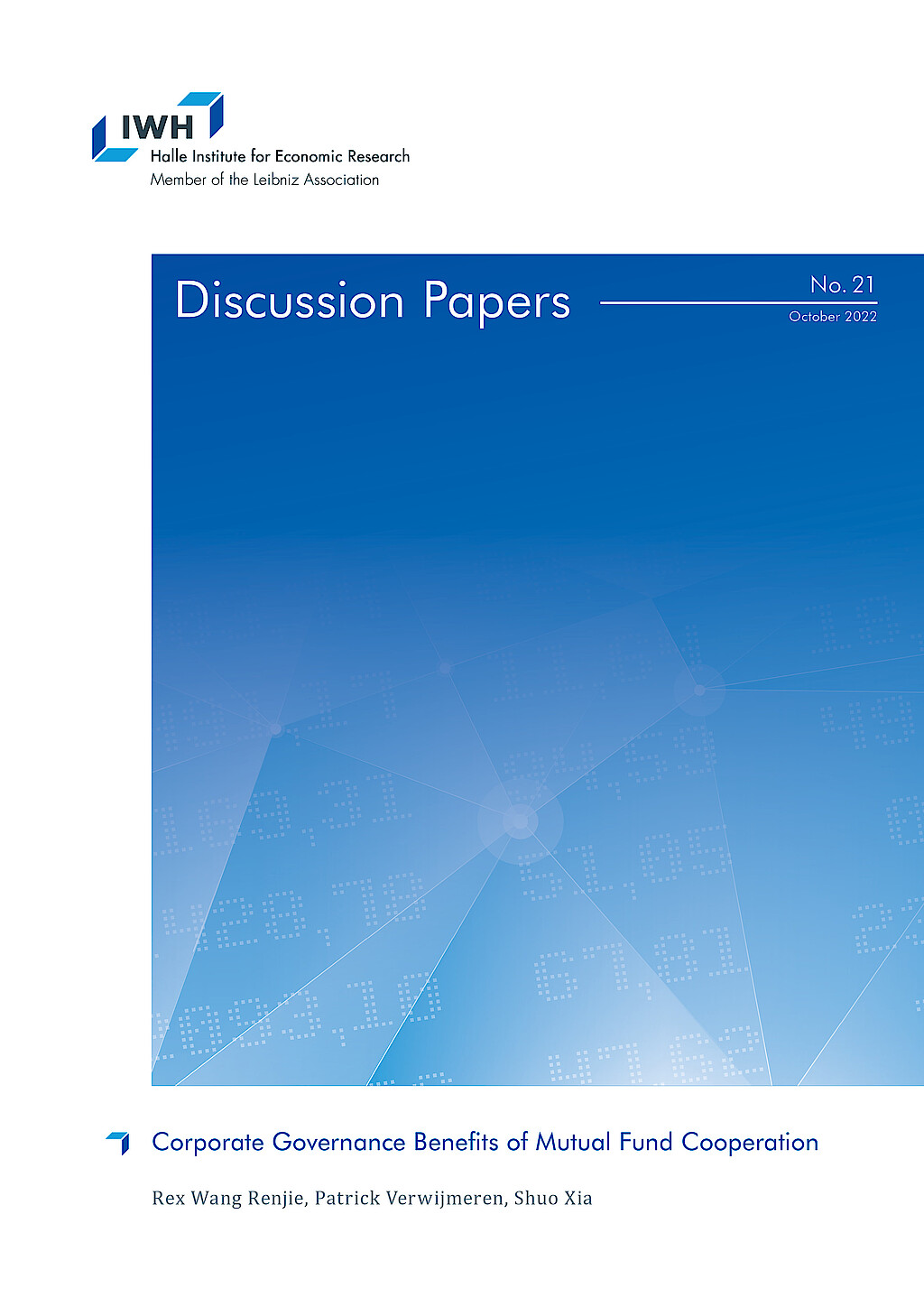
Corporate Governance Benefits of Mutual Fund Cooperation
in: IWH Discussion Papers, No. 21, 2022
Abstract
Mutual fund families increasingly hold bonds and stocks from the same firm. We study the implications of such dual holdings for corporate governance and firm decision-making. We present evidence that dual ownership allows financially distressed firms to increase investments and to refinance by issuing bonds with lower yields and fewer restrictive covenants. As such, dual ownership reduces shareholder-creditor conflicts, especially when families encourage cooperation among their managers. Overall, our results suggest that mutual fund families internalize the shareholder-creditor agency conflicts of their portfolio companies, highlighting the positive governance externalities of intra-family cooperation.

Why Do Workers at Larger Firms Outperform?
in: Working Paper, 2020
Abstract
Workers at larger firms outperform on average. For example, equity analysts working for more reputable brokerage firms produce more accurate earnings forecasts. Analysts employed by the highest ranked brokerages are about 6% more accurate than those employed by the lowest ranked brokerages, which is equivalent to an advantage of 17.5 years of more experience. This outperformance is driven by two significant effects: more reputable firms provide more resources that improve analysts' forecasting ability (influence), while more reputable firms also attract more talented candidates (sorting). We estimate a two-sided matching model to disentangle these two effects. We find that the direct influence effect accounts for 73% of the total impact while the sorting effect accounts for the remaining 27%.

Lame-Duck CEOs
in: SSRN Working Papers, 2018
Abstract
We examine the relationship between protracted CEO successions and stock returns. In protracted successions, an incumbent CEO announces his or her resignation without a known successor, so the incumbent CEO becomes a “lame duck.” We find that 31% of CEO successions from 2005 to 2014 in the S&P 1500 are protracted, during which the incumbent CEO is a lame duck for an average period of about 6 months. During the reign of lame duck CEOs, firms generate an annual four-factor alpha of 11% and exhibit significant positive earnings surprises. Investors’ under-reaction to no news on new CEO information and underestimation of the positive effects of the tournament among the CEO candidates drive our results.

Selection Versus Incentives in Incentive Pay: Evidence from a Matching Model
in: SSRN Working Papers, 2018
Abstract
Higher incentive pay is associated with better firm performance. I introduce a model of CEO-firm matching to disentangle the two confounding effects that drive this result. On one hand, higher incentive pay directly induces more effort; on the other hand, higher incentive pay indirectly attracts more talented CEOs. I find both effects are essential to explain the result, with the selection effect accounting for 12.7% of the total effect. The relative importance of the selection effect is the largest in industries with high talent mobility and in more recent years.










